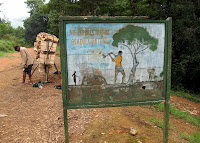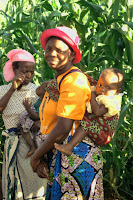and if you have any pictures of your Christmas in Canada or wherever, please share them with us (just no huge files by email please, 1500kb/email max).
From our family to yours, we wish you a very merry Christmas and a blessed new year.

| At $33,375 the average Canadian is in the TOP 7.21% richest in the world! Discover how rich you are! >> |
From our family to yours, we wish you a very merry Christmas and a blessed new year.

 sauce and all sorts of other good stuff. We're missing out on that this year, but don't worry, we'll have some nsima and relish. Actually, I can't say we are lacking anything. Just on Saturday, for example, I had my third meal of the day at noon. We had gone for a visit in a nearby village in the morning. They offered us nsima and beans, which of course I couldn't turn down, even though I knew that we had to get home in time to go over to our neighbour's house because we had been invited for lunch. Our neighbour Mary is an amazing cook. I could eat nsima every day if she was cooking. And she did prepare a feast for us (although of course she denied that it resembled anything like a feast). Rice, nsima,
sauce and all sorts of other good stuff. We're missing out on that this year, but don't worry, we'll have some nsima and relish. Actually, I can't say we are lacking anything. Just on Saturday, for example, I had my third meal of the day at noon. We had gone for a visit in a nearby village in the morning. They offered us nsima and beans, which of course I couldn't turn down, even though I knew that we had to get home in time to go over to our neighbour's house because we had been invited for lunch. Our neighbour Mary is an amazing cook. I could eat nsima every day if she was cooking. And she did prepare a feast for us (although of course she denied that it resembled anything like a feast). Rice, nsima,  delicious curry beef (her curry chicken is just amazing too), some very nice chambo (tilapia fish, especially for Ezera because apparently she had seen the whole fish in our neighbour's kitchen and wanted to eat it), and some 'spinach' relish. Hmmm, just excellent food. Had seconds too, even though that was my third meal for the day. Just skipped dinner that evening. I could very well gain some weight while we're here with all the starches we're eating: nsima, rice, bread, potatoes...
delicious curry beef (her curry chicken is just amazing too), some very nice chambo (tilapia fish, especially for Ezera because apparently she had seen the whole fish in our neighbour's kitchen and wanted to eat it), and some 'spinach' relish. Hmmm, just excellent food. Had seconds too, even though that was my third meal for the day. Just skipped dinner that evening. I could very well gain some weight while we're here with all the starches we're eating: nsima, rice, bread, potatoes... (not to spoil your thanksgiving feasting or anything, it's good to celebrate, even the poor celebrate by sharing the food they have, but it's also good to think about life from a broader perspective sometimes)
(not to spoil your thanksgiving feasting or anything, it's good to celebrate, even the poor celebrate by sharing the food they have, but it's also good to think about life from a broader perspective sometimes)

By the year 2020, Malawi as a God-fearing nation will be secure, democratically mature, environmentally sustainable, self reliant with equal opportunities for and active participation by all,having social services, vibrant cultural and religious values and being a technologically driven middle-income economy.Desirable, ambitious, yes. Attainable, not likely.
I was looking at some statistics the other day for Malawi and the area I am working in, Machinga. Mind boggling.
I was changing some of the door locks in the house because they had been installed backwards and didn’t close properly. After changing the door latch in our bedroom, I turned the key to make sure it lined up with the door jam, which it did. Problem was, it wouldn’t unlock again. What made it even more complicated is that Alex also happened to be in the bedroom at the same time and because all our windows are barred, it’s impossible to just climb out a window. So there we were, locked in our bedroom, and the girls on the other side of the door. After trying a few things we called Lara over for her to try the key from the outside; when that didn’t work, we called our gardener over to try to help us out, but to no avail. Finally Alex convinced me to let Lara get the cell phone and pass it through the window so we could call for help. We called Mike; he had a good laugh of course. Getting the door unlocked wasn’t going to be easy – we tried wiggling, wedging, different keys, etc. So Sarah also came over and took the kids to her house. We tried everything we could to get the door open. Then I set to work on the hinge pins. They had been painted over many times, they were bent, and I had no tools other than what my gardener kept passing through the window to help: an iron bar, an axe (should’ve just chopped a hole through the door), a few nails, a screwdriver, some rocks. Getting the top pin out was a lot of work but eventually it made its way out. The bottom pin was a different story – no proper tools, lots of paint and rust, and too close to the floor to hit the screwdriver properly with my iron bar. Then Alex had the bright idea to use some vegetable oil to lubricate the pin, that sure helped. Eventually got the pins out, so now it was stand back and let Mike kick the door in. It took a lot of kicking and pushing to get some movement, but eventually we were freed, with only one hole in the door to show for it. We were locked in our bedroom for 2 hours just because I wanted to fix the door latch. Not exactly how we had planned to spend our Saturday morning, but I guess it makes for a good story.
Like Alex's aunt said, we discovered that maybe
"Yes, those bars on the windows are for keeping desperate people in - not desperate people out!"
----------
- sat-aug 2: goodbye potluck at the park (JOIN US! noon-3pm at Main Beach, Cultus Lake)
- sun-aug 3: special send-off services at our home church (Sardis Fellowship) and send-off party at the Pronk's (3-5pm)
- wed-aug 6: fly to Toronto for EI orientation and training
- fri-aug 8: weekend with Cambodian missionary friends in Niagara Falls
- sun-aug 17: African church service in Toronto
- mon-aug 18: travel Toronto-London
- tue-aug 19: travel London-Johannesburg
- wed-aug 20: travel Johannesburg-Blantyre, Malawi
 Only 20 days to go! [until training in Ontario; 32 days till we leave for Malawi].
Only 20 days to go! [until training in Ontario; 32 days till we leave for Malawi]. Listen to the powerful story of Stephen Lungu of Africa Enterprise in Malawi on Haven Today [8July08]. Stephen Lungu is one of Africa's top evangelists--saved from a life of poverty and gang involvement to testify of God's grace to change lives.
Listen to the powerful story of Stephen Lungu of Africa Enterprise in Malawi on Haven Today [8July08]. Stephen Lungu is one of Africa's top evangelists--saved from a life of poverty and gang involvement to testify of God's grace to change lives. We would like to say a special thank you to:
We would like to say a special thank you to:

The Triple Dip Fundraiser is a set of three Epicture dip mixes, recipe booklet and accompanying, reusable presentation bag with velcro closing. $20 (40% for Malawi)
Debbie Fortnum is a local singer/songwriter/pianist with a heart for missions who has produced 5 wonderful CDs. Listen. CDs $20 each (50% for Malawi)
People who have a stake in the success of a thing are less likely to destroy it, so property-owning people are less likely to destroy by pollution the life they enjoy. But to the poor, life is a struggle: they care little for anything but daily sustenance, much less the environment.
To get out of poverty you need economic development. To get economic development you need a stable economy with property rights, the rule of law and economic freedom: so why don’t we focus on how we can lift everybody out of the mud of poverty? Poverty is neither quaint nor environmentally friendly, whatever eco-tourists might think.
 This is the dilemna we will probably face in promoting sustainability. The people of Malawi are living in survival mode. How do we lift the poor out of poverty toward sustainability? I believe extending the Kingdom of God has something to do with it...
This is the dilemna we will probably face in promoting sustainability. The people of Malawi are living in survival mode. How do we lift the poor out of poverty toward sustainability? I believe extending the Kingdom of God has something to do with it...

He said Malawi's main focus was to "fight poverty." About half of the 12-million citizens live below the poverty line and on less than $1 a day.
Mutharika said his country had six priorities, including improving its agriculture -- the economy's backbone -- as well as transport and communications, irrigation, food security and energy.
"And of course we want to fight HIV and Aids," he added. About 14% of Malawians are infected with the killer syndrome.
"We are asking all our donors to focus on this. This is the way we will move forward," Mutharika said. - AFP [Mail & Guardian]
 IN THE NEWS: Despite Malawi's problems with poor roads and storage and uneven food distribution that leave many hungry, there have been overall grain surpluses. Rains have been good for two years, and subsidies have helped farmers buy seeds and fertilizers. President Bingu Mutharika says Malawi must lessen its dependence on charity. [PBS 9 May 2008]
IN THE NEWS: Despite Malawi's problems with poor roads and storage and uneven food distribution that leave many hungry, there have been overall grain surpluses. Rains have been good for two years, and subsidies have helped farmers buy seeds and fertilizers. President Bingu Mutharika says Malawi must lessen its dependence on charity. [PBS 9 May 2008]President BINGU WA MUTHARIKA: "We now have had the success -- two successive years of surplus. When I took over, we were told Malawi was poor and that we must go to the rest of the world and beg that we are poor, and the world will feel sorry for us. I said no, that's not the way the world in globalization works. People will come to Malawi to invest in opportunities if we are helping ourselves and they want to be part of that success story. Nobody, nobody wants to be part of a failing story."
holistic -- attend to the needs of the whole person: social, physical, emotional, and spiritual
church centred -- partner with churches within needy communities worldwide in order to meet the specific needs of the people within those communities
people centred -- take God's love into towns, villages, and homes
self-reliant -- build the self-reliance and dignity of those involved
grass roots -- meet the basic needs and use simple technology, easy to replicate and maintain